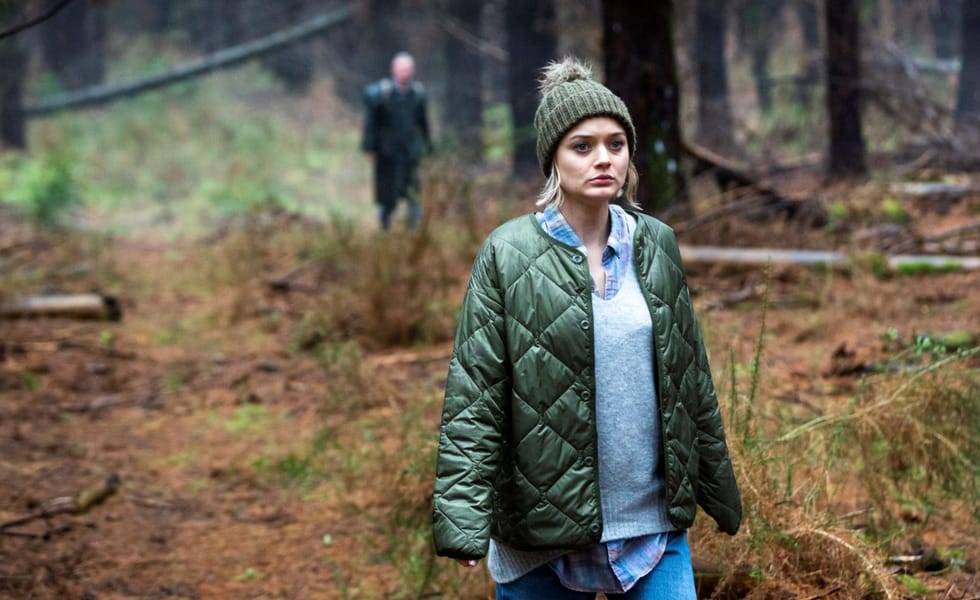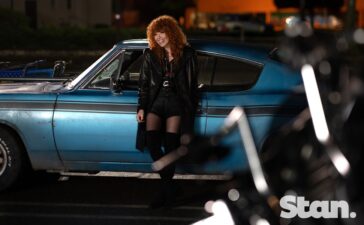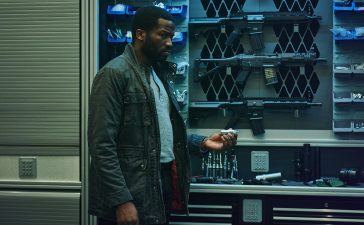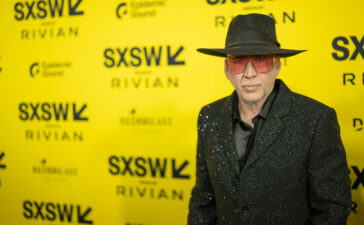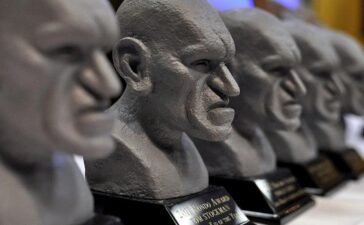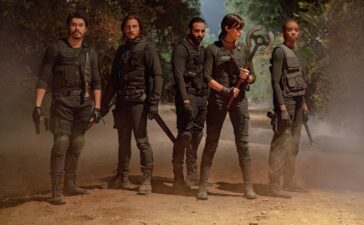Currently streaming on Stan, the new horror movie Relic sees a woman (Emily Mortimer) and her adult daughter (Bella Heathcote) contend with the family matriarch’s (Robyn Neville) worsening dementia, only for events in the old woman’s decrepit house to take a turn for the supernatural. Honestly, it’s a great movie to go into cold, so check it out now and then come back here for a chat with Melbourne-based writer and director Natalie Erika James, who makes her feature debut with the film.
What was the inspiration for the film? What was the genesis of Relic?
It really came from a personal place. My grandmother had Alzheimer’s herself for quite some time before she passed. I can tell you about the trip that I took to Japan to go see her. This particular trip was quite a notable one for me, because it was the first time she couldn’t remember who I was. It was quite heartbreaking and really jarring when someone who only looked at you with love and affection starts looking at you like you’re a stranger. She also lived in this quite scary traditional Japanese house. It always really freaked me out as a kid. So, I think the combination of those two things is really the starting point for the film.
You’re coming from a background of music videos, a lot of really well-regarded short films and TV commercials. What was the process like transitioning from this sort of shorter form stuff to a full feature?
Yeah, it was certainly a leap. The sheer endurance of it is always a transition because the longest I’ve been on set prior to Relic was probably about ten days in a row, whereas this was six weeks. And it’s not only the shooting, but the post-production. I think we did about seven to nine months on it. It’s a really long time to be staring at the same material. You have to constantly find inspiration in the process because you are really just looking at the same hour and a half over and over. I probably watched it about 300 times.
I also think when you’re doing smaller projects, the creative decisions kind of end with you, whereas sometimes when you’re on a larger project you have more producers, more investors, more notes, so it can be a step up, but it can be challenging to try.
It’s a fairly self-contained film. It’s largely just in the house and you’ve got a small cast. Were you writing with budget in mind?
I don’t think about budget when I’m writing. You certainly have to reign yourself in at certain points; sometimes you have to make cuts because that’s just the reality of how much money you have. But I never write with budget in mind. I think horror is great because isolation is often a key component of the narrative – that happens quite naturally and that can be very intimate. I think I’m also just really drawn to subjective storytelling, which tends to focus on an intimate study of a few people.
But having said that I’m writing a new project that is an ensemble cast; there’s an immense amount of characters and the locations are grand and the scope of it is almost the opposite of Relic.
“I guess it’s kind of like comedy in a way, in that it either works or it doesn’t, you either scare people and make people laugh or you don’t.”
Who are some of your influences as directors, particularly in the horror genre?
If you go further back to what I was watching as a teen, I was a massive fan of Asian horror. Kurosawa Kiyoshi, his film Pulse (2001) had a massive impact on me. I watched The Shining (1980) really young, so Kubrick is a classic. I think that scarred me very young and left an impression on me.
Who else? I mean, I guess more recently people like David Robert Mitchell, who did It Follows (2014). I loved The Witch (2015). I guess elevated horror I’m really drawn to in general.
I’d say my, my biggest influence when I started watching cinema in earnest, apart from Kubrick, it was very much about David Lynch and his ability to capture the sense of the uncanniness of life and surrealism. Then there’s Lars von Trier, Jonathan Glazer, Ben Wheatley. Darren Aronofsky was one of my early idols, with PI (1998) and Requiem for a Dream (2000), Black Swan (2010) and all those earlier films, As a young filmmaker, those are the films that I really looked up to.
Obviously, the cast is always important, but in a small-scale kind of operation like this, you really need to populate your film with the right kind of people. What was your casting process like?
It was quite a new process for me because prior to this, I’d only ever auditioned actors, whereas when you’re looking to cast actors who have a certain profile it’s not really auditioning at all. It’s more about looking at their previous work and just having discussions with them in person. So, meeting them was a big factor, and you have these creative conversations about potential combinations. And there are shifting parts in that discussion because they have to look feasibly like a family as well. They all seemed to really understand the heart of the film. Some people can be really put off by the horror genre in general, whereas it was never a concern for all three of them.
How do you have faith in your ability to scare people on screen?
I guess it’s kind of like comedy in a way, in that it either works or it doesn’t, you either scare people and make people laugh or you don’t. It can seem like a bit like magic in a way or very mysterious, but there are methods and references. I am personally very susceptible to horror, which I think is helpful because I have a more attuned sense of what is scary. Horror is really subjective as well; I think it really depends on your childhood and what scared you as a kid and translating that to your adult life.
I think you can only work with what works for you as the director, because what scares me isn’t necessarily going to scare you, and vice versa. I think the only real compass you have as a director is your own vision or intuition, so you just have to be true to that. It’s your only guiding light.
Do you want to be a horror director or do you want to spread a wider net?
I love drama. I just want to make films that ask big questions. I’m really drawn as well to depicting life or the essence of life, as opposed to cinema verite or any hyper-realistic film where it’s just life as it is – that doesn’t interest me as much. I like magical realism and that can manifest in so many ways.
The design of the film is great, particularly the house where the physical environment reflects the psychological landscape of the characters. Can you walk me through the process and some of the creative decisions you made to get to what we see on the screen?
When I was writing the film I was really attached to the idea of the house being bigger on the inside than the outside, and the idea that like the Alzheimer’s is affecting Edna, it was also starting to affect the configuration of the house and this idea of being lost inside that.
I also saw this doco about a man with Alzheimer’s explaining how he’d become lost in his own house. He’d go into the kitchen and quickly forget how to get back into the bedroom, which was really heartbreaking. I was trying to look for a way to physicalise that feeling, I suppose. We really wanted the design of the house itself, the labyrinth itself, to be a gradual descent into madness. We were trying to stay away from having a really abrupt shift into another world, and so that gradual decline mimics real life and what that experience is like.


